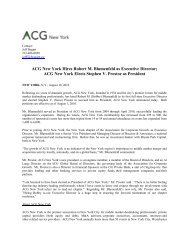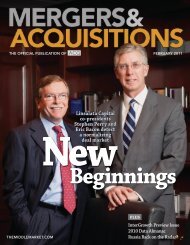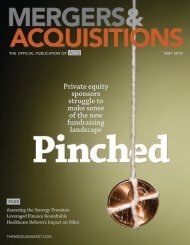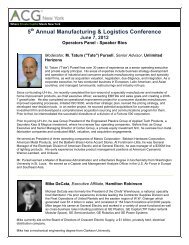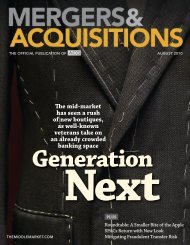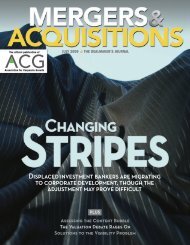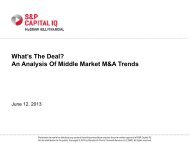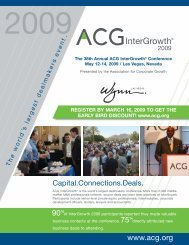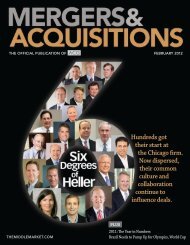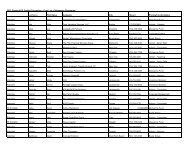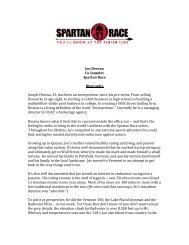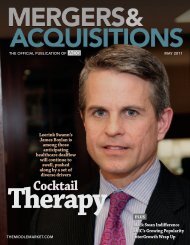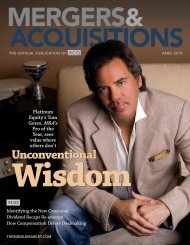Not one to mince words, KPS Capital's Michael Psaros offers a ...
Not one to mince words, KPS Capital's Michael Psaros offers a ...
Not one to mince words, KPS Capital's Michael Psaros offers a ...
- No tags were found...
You also want an ePaper? Increase the reach of your titles
YUMPU automatically turns print PDFs into web optimized ePapers that Google loves.
06-08,78-85_ACG.qxd 4/6/09 5:11 PM Page 78THE PULSEThe PulseAs taxpayer capital makes its way in<strong>to</strong> the banking system and in<strong>to</strong> other cornerst<strong>one</strong>industries, will a corollary be increased protectionism? What will be the impact on M&A?As taxpayer funds find their way in<strong>to</strong> theprivate sec<strong>to</strong>r there should be some motivationfor these taxpayers/shareholders <strong>to</strong> support theinstitutions receivingthe benefit.Having saidthat, no intelligentperson orentity throwsgood m<strong>one</strong>y afterbad. Unlessthe institutionsbeing supported<strong>Michael</strong> D. Sharkeychange theirways and operatemore efficientlyand safelyor producemore valuablegoods or services,his<strong>to</strong>ry will repeat itself and more supportwill be required.I find it fascinating that the same economiststhat have been supporting free marketsfor all these years are suddenly advocating suchbroad sweeping government intervention. It isamazing what the threat <strong>to</strong> <strong>one</strong>s’ personalwealth will do <strong>to</strong> <strong>one</strong>s’ beliefs. Of course no <strong>one</strong>wants <strong>to</strong> see us slip back in<strong>to</strong> the dark ages.— <strong>Michael</strong> D. Sharkey, President,Cole Taylor Business Capital—————————When a mezzanine lender tightly wrapscovenants around the borrower and takes warrantsfor the upside, we don’t call that protectionism.We say its part of the cost of doing business.Why should we expect anything differentfrom the government? After all, the guys responsiblefor putting the TARP funds <strong>to</strong> workare experienced investment bankers, right?Unfortunately, political motivations causelegislatures <strong>to</strong> seek protection beyond what aprudent business person would want. It is humannature - thepoliticians need<strong>to</strong> be able <strong>to</strong> say<strong>to</strong> their constituentsthatthey extracted“concessions”and put in place“controls” <strong>to</strong>oversee the taxdollars beingused <strong>to</strong> “bail outgreedy corpora-John M. Suendertions thatfailed” so that it“doesn’t happenagain.” In reality,the government is grossly ill equipped <strong>to</strong>oversee the management of a business, but thepoliticians feel that they owe it <strong>to</strong> their voters <strong>to</strong>try. At the end of the day, the US governmentappears <strong>to</strong> be the true lender of last resort, soprotectionism becomes part of the cost of doingbusiness.The TARP funds are not only good for M&A,they are essential. Without banks making loans,there are no deals. The market will figure out away <strong>to</strong> price the cost of protectionism in<strong>to</strong> dealsand we will survive.—John M. Suender, Direc<strong>to</strong>r,Suender M&A Advisors LLC—————————The federal government, by injecting taxpayercapital directly in<strong>to</strong> cornerst<strong>one</strong> industries,will take an increasingly dominant positionin corporate decision-making, which bybecoming nationalized will become unavoidablypoliticized. Congressmen play by political rules,not business rules. Much of the pressure <strong>to</strong> bailout the au<strong>to</strong> industry is coming from unionizedlabor, which has close ties <strong>to</strong> the DemocraticParty (now in almost complete control of thefederal government), and which has seen its influencewane over the last decades.With the government now exerting partialcontrol, and with Democratic dominance of thegovernment, federal decision-making concerningthe au<strong>to</strong> and financial industry inevitablywill increasingly reflect Democratic Party (andunion) policies (e.g., trade, livable-wages, electriccars, home mortgages <strong>to</strong> low-income families),whether or not those policies make eco-Don Keyssernomic orbusiness sense.How will theau<strong>to</strong> companiesmake decisionson bringing <strong>to</strong>the US theirsuccessful au<strong>to</strong>sfrom Europeand Latin America?How willthey make decisionson expandingproductionin non-USplants (e.g.,Mexico), <strong>to</strong> reducelabor costs? How will banks be able <strong>to</strong>tighten mortgage lending guidelines, which78 ACG > MERGERS & ACQUISITIONS February 2009



